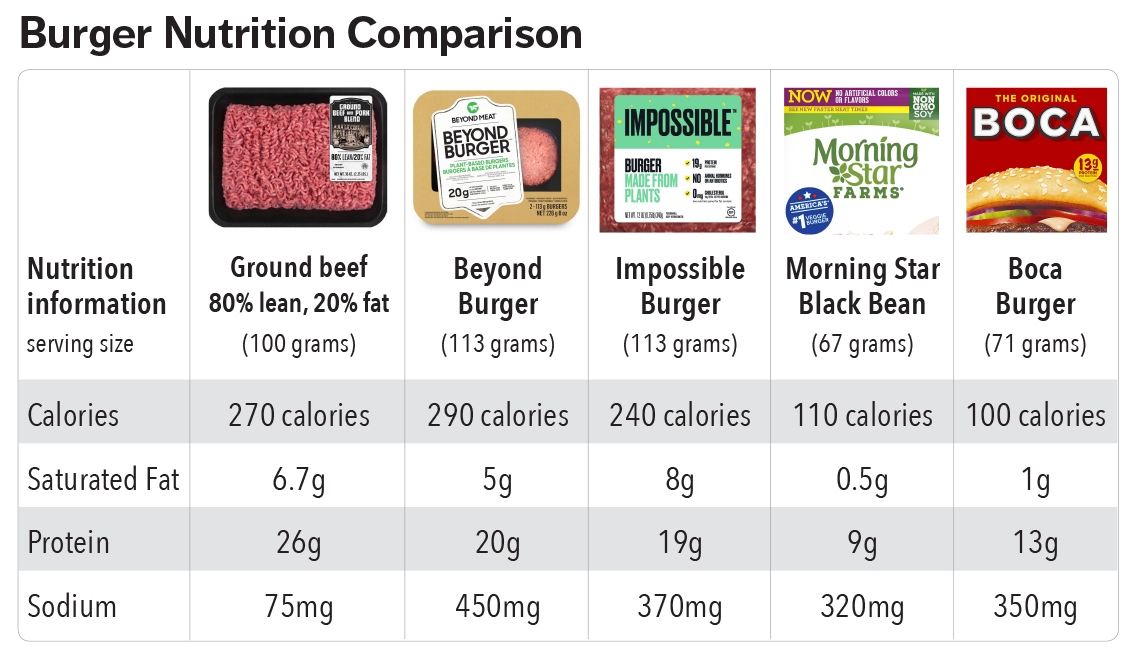As alternative meat products continue to generate buzz, it is important to understand the ingredients before swapping out meat for meatless. We asked our expert nutritionist Jessica McGee to weigh in on whether fake meat is good or bad for children.
Plant-based products are emerging as the new popular food choice for meat-eaters and non-meat-eaters alike, but they may not be the smarter choice for your kid. There are pros and cons to eating meat alternatives so it’s important to be informed when deciding what to feed your child.
Comparing Meat vs. Meatless
One of the challenges we face when selecting meat substitutes is that they are often highly processed, resulting in greater amounts of saturated fat and sodium than the whole plant and even sometimes higher than meats, as shown below.

Image courtesy of AARP.
High sodium and saturated fat intake in children is associated with high blood pressure and cholesterol levels, respectively, which can raise the risk for heart disease or stoke later in life.
What should parents do before choosing fake meat?
Parents should consider the nutritional facts and big picture so that they can make an informed decision when it comes to meat alternatives. With many foods there are pros and cons so it’s important to find a balance for your child and family.
Some of the benefits of meat alternatives include added antioxidants and fiber from some of the ingredients in products like soy and whole grains. Another benefit to meat substitutes compared to real meat is food safety and the reduced risk of Salmonella or E.coli infection. Most meat alternatives are already cooked and only require heating, whereas it’s essential to cook raw meat with the appropriate equipment, cleanliness and to proper temperatures. Lastly, environmental sustainability is a huge benefit to reducing meat intake with meat substitutes. The Academy of Nutrition and Dietetics states “plant-based diets are more environmentally sustainable than diets rich in animal products because they use fewer natural resources and are associated with much less environmental damage.”
There are some disadvantages of meat alternatives when compared to meat, such as higher sodium and saturated fat content as mentioned above. Meat alternatives also lack vitamin B12, which is found in foods from animals like meat, dairy and eggs. Additional things that parents may want to consider when deciding whether or not to purchase meat alternatives are the fact that they are often more expensive than real meat, they contain top allergens and are highly processed.
Meat substitutes can be included as part of a healthy diet when choosing products with minimal processing and fillers made with plant foods like legumes, vegetables, tofu and whole grains.
References:
- Hultin, Ginger. “Meat Substitutes” Today’s Dietitian. June 2019 Issue. Vol 21, No.6, P.18
- Melina V, Craig W, Levin S. Position of the Academy of Nutrition and Dietetics: vegetarian diets. J Acad Nutr Diet 2016 (12): 1970-1980.
 https://riseandshine.childrensnational.org/wp-content/uploads/2026/02/olympics-feature.png
300
400
webteam
https://riseandshine.childrensnational.org/wp-content/uploads/2017/11/childrens_riseandshine_logo.jpg
webteam2026-02-05 16:41:512026-02-06 08:51:52What the Winter Olympics can teach our children
https://riseandshine.childrensnational.org/wp-content/uploads/2026/02/olympics-feature.png
300
400
webteam
https://riseandshine.childrensnational.org/wp-content/uploads/2017/11/childrens_riseandshine_logo.jpg
webteam2026-02-05 16:41:512026-02-06 08:51:52What the Winter Olympics can teach our children



 Jessica McGee, MS, RD, CSP, LD, CNSC, was the Food and Nutrition Services Clinical Nutrition Manager at Children's National.
Jessica McGee, MS, RD, CSP, LD, CNSC, was the Food and Nutrition Services Clinical Nutrition Manager at Children's National.


















Leave a Comment
Want to join the discussion?Feel free to contribute!